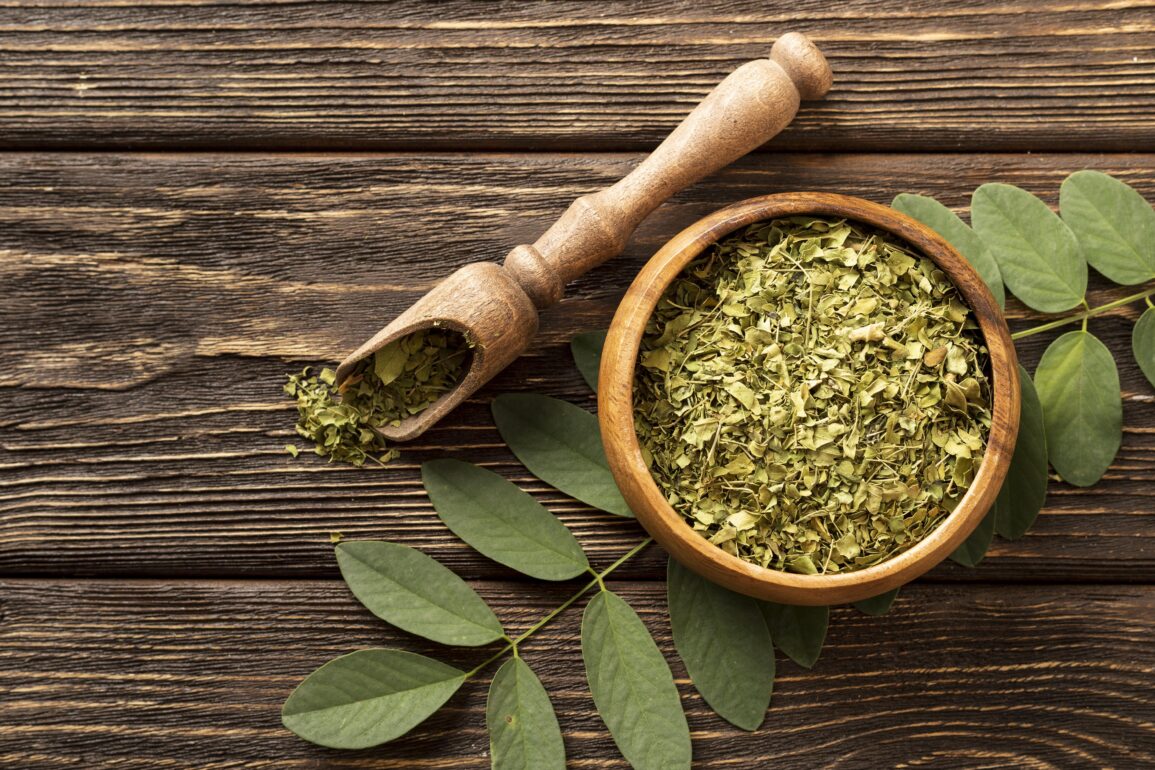Moringa Oleifera, often referred to as the “Miracle Tree,” is celebrated for its impressive nutritional profile and potential health benefits. Originally from India, moringa is rich in antioxidants, vitamins, and minerals, making it a popular choice in the wellness world. This guide will cover everything you need to know about Moringa Oleifera benefits, side effects, precautions, and answers to frequently asked questions (FAQs).
What is Moringa Oleifera?
Moringa Oleifera is a fast-growing tree native to South Asia. Almost all parts of the plant, including the leaves, pods, seeds, and roots, are edible and have been traditionally used in medicine and cooking.
Nutritional Profile of Moringa Oleifera
| Nutrient | Amount per 100g of Moringa Leaves |
|---|---|
| Protein | 9.4 g |
| Vitamin A | 7564 IU |
| Vitamin C | 51 mg |
| Calcium | 185 mg |
| Potassium | 337 mg |
| Magnesium | 42 mg |
| Iron | 4 mg |
| Fiber | 2.1 g |
| Vitamin B6 | 1.2 mg |
Health Benefits of Moringa Oleifera
- Rich in Antioxidants
Moringa is packed with antioxidants like quercetin and chlorogenic acid, helping to fight oxidative stress and inflammation. - Boosts Immunity
With high levels of Vitamin C, moringa supports a healthy immune system, potentially reducing the risk of infections. - Supports Heart Health
Moringa can help lower cholesterol, which may reduce the risk of heart disease. Its potassium content also promotes healthy blood pressure. - Improves Digestive Health
The fiber in moringa aids digestion, supports gut health, and can help prevent constipation. - Promotes Healthy Skin and Hair
Antioxidants and essential vitamins in moringa improve skin radiance, reduce signs of aging, and strengthen hair. - Supports Blood Sugar Control
Some studies suggest moringa may help regulate blood sugar levels, beneficial for managing diabetes. - Enhances Bone Health
Moringa contains calcium and phosphorus, which are essential for maintaining bone density and strength.
Advantages of Moringa Oleifera
| Advantage | Detailed Description |
|---|---|
| Nutrient-Dense Superfood | Moringa is packed with essential nutrients, including vitamins A, C, B6, calcium, potassium, and iron. Just one serving offers a significant portion of daily nutrient requirements, making it beneficial for those who lack access to diverse foods. Its nutrient density also makes it an ideal addition for people on restricted diets or those with high nutritional needs, such as athletes and pregnant women. |
| Rich in Antioxidants | Moringa contains potent antioxidants like quercetin, chlorogenic acid, and beta-carotene, which combat oxidative stress and inflammation. Oxidative stress is a major contributor to chronic diseases, such as heart disease and cancer, and antioxidants in moringa may reduce this risk. Regular antioxidant intake is linked to reduced aging signs and improved overall cell health. |
| Boosts Immune System | The immune-boosting power of moringa comes from its high Vitamin C, Vitamin A, and essential minerals, which are crucial for immune function. These nutrients support the production of white blood cells and antibodies, which are vital for fighting infections. Moringa’s high iron content also aids in preventing anemia, which can weaken immunity. |
| Promotes Heart Health | Moringa’s ability to reduce cholesterol levels makes it a natural ally for heart health. Studies suggest that moringa can help lower LDL (bad) cholesterol, which contributes to arterial plaque buildup and increases the risk of heart disease. Additionally, moringa’s high potassium levels help regulate blood pressure, reducing strain on the cardiovascular system. |
| Stabilizes Blood Sugar | Moringa may help regulate blood sugar levels by reducing the rate of sugar absorption. This property is particularly useful for people with type 2 diabetes or those with insulin resistance. Studies indicate that the chlorogenic acid in moringa can improve blood sugar control by influencing the way the body processes sugar after meals. |
| Improves Digestive Health | Moringa is high in fiber, which aids in digestion, promotes regular bowel movements, and helps prevent constipation. Fiber also plays a crucial role in maintaining gut health by feeding beneficial gut bacteria. A healthy gut is essential for nutrient absorption, immunity, and mental health, making moringa’s fiber content especially valuable. |
| Anti-Inflammatory Properties | Chronic inflammation is a common factor in many health issues, including arthritis and heart disease. Moringa’s anti-inflammatory compounds, such as isothiocyanates, can help reduce inflammation throughout the body. This can lead to improved joint health, reduced pain, and a decreased risk of inflammatory-related diseases. |
| Good for Skin and Hair | Moringa contains vitamins and antioxidants that are beneficial for skin and hair health. Vitamin A, for example, is essential for healthy skin cells, while antioxidants combat free radicals that contribute to premature aging. Moringa oil can be applied topically to moisturize and rejuvenate the skin, and it can also strengthen and nourish hair, helping to reduce hair loss and improve hair texture. |
| May Aid in Weight Loss | Due to its metabolism-boosting and nutrient-dense nature, moringa can be helpful for those looking to lose weight. Its fiber content helps promote satiety, reducing overall calorie intake. Additionally, moringa’s ability to stabilize blood sugar can help prevent spikes in hunger, making it easier to stick to a balanced diet. |
| Eco-Friendly and Sustainable | Moringa is a fast-growing and drought-resistant tree, making it an eco-friendly option for sustainable agriculture. Its resilience allows it to thrive in harsh environments, providing communities with a steady source of nutrition without depleting resources. Moringa trees also improve soil fertility and reduce erosion, contributing to more sustainable land use. |
Disadvantages of Moringa Oleifera
| Disadvantage | Detailed Description |
|---|---|
| Digestive Issues in High Doses | Overconsumption of moringa, especially in powder or capsule form, may lead to digestive discomfort, including diarrhea, bloating, and stomach cramps. This is often due to the high fiber content, which can be challenging for some people to digest in large amounts. It’s recommended to start with small doses and gradually increase to avoid these issues. |
| Potential for Lowering Blood Pressure | While beneficial for those with high blood pressure, moringa’s blood pressure-lowering effect can be risky for individuals with low blood pressure. Taking moringa alongside blood pressure medications can also cause blood pressure to drop too low, leading to dizziness, fainting, and potentially dangerous hypotension. |
| Interactions with Medications | Moringa may interact with various medications, including those for diabetes, blood pressure, and thyroid function. For instance, its blood sugar-lowering effect can enhance the effect of diabetes medication, potentially leading to hypoglycemia. Similarly, moringa’s effect on blood pressure could intensify the effect of antihypertensive drugs. Always consult a healthcare provider before adding moringa to your regimen if you’re on medication. |
| Potential Strain on Liver and Kidneys | Prolonged or excessive intake of moringa may put strain on the liver and kidneys. While moringa is generally safe in recommended doses, high doses can lead to toxicity due to the presence of alkaloids and other compounds that the liver and kidneys must filter. Over time, this can cause strain on these organs, especially for individuals with pre-existing conditions. |
| Strong, Bitter Taste | Moringa has a naturally bitter and earthy taste that may not appeal to everyone. This can make it difficult for some people to incorporate into their diet. Those sensitive to the taste may prefer capsules or tablets as an alternative to powders or teas. However, many people add it to smoothies or mix it with other ingredients to mask the flavor. |
| Risk of Allergic Reactions | Some individuals may experience allergic reactions to moringa, including symptoms like itching, hives, swelling, or even difficulty breathing. If you have a history of allergies, especially to other plants in the Brassica family, use caution and try a small amount first to gauge your body’s reaction. |
| Not Recommended During Pregnancy | Certain parts of the moringa plant, particularly the root and bark, contain compounds that can cause uterine contractions and potentially lead to miscarriage. Pregnant women are generally advised to avoid these parts of the plant. Leaf powder and other parts are considered safer, but it’s best to consult a doctor before using moringa during pregnancy. |
| Potential for Hypoglycemia in Diabetics | While moringa can help regulate blood sugar, taking it alongside diabetes medication can lower blood sugar to dangerous levels, resulting in hypoglycemia. Symptoms include sweating, confusion, shakiness, and even loss of consciousness. Diabetics should monitor blood sugar closely if incorporating moringa and consult with their doctor about adjusting medication if necessary. |
| Limited Research on Long-Term Effects | While moringa has been used traditionally for centuries, there is limited scientific research on its long-term effects. Most studies focus on short-term benefits or animal models, and more research is needed to fully understand its impact on human health when used over long periods. |
Side Effects of Moringa Oleifera
While Moringa Oleifera is generally safe, excessive consumption or improper use can lead to certain side effects.
| Side Effect | Description |
|---|---|
| Digestive Issues | Overconsumption may lead to diarrhea, bloating, and upset stomach. |
| Lower Blood Pressure | Moringa has a blood pressure-lowering effect, which may be risky for hypotensive individuals. |
| Nausea and Vomiting | Some people may experience nausea or vomiting, especially if moringa is consumed on an empty stomach. |
| Liver and Kidney Strain | High doses over extended periods may stress the liver and kidneys due to alkaloid compounds. |
Precautions for Using Moringa Oleifera
- Pregnant and Breastfeeding Women: Pregnant women should avoid moringa root and bark, as they may cause uterine contractions and lead to complications. Nursing women should consult a healthcare provider before using moringa.
- Children: Moringa is generally safe for children in small amounts, but excessive doses are not recommended.
- People on Medications: Moringa may interact with certain medications, particularly those for diabetes, blood pressure, and thyroid disorders. Always consult with a healthcare provider if you’re on medication.
- Pre-Existing Conditions: People with conditions like low blood pressure or liver issues should use moringa with caution and only under medical supervision.
Gender-Specific Benefits of Moringa Oleifera
Benefits for Women
| Benefit | Description |
|---|---|
| Hormonal Balance | Moringa may help balance hormones, especially beneficial for women experiencing menopause. |
| Enhanced Skin Health | High antioxidants and Vitamin A contribute to youthful skin and may reduce acne flare-ups. |
| Iron Source for Anemia | Moringa’s iron content can help combat anemia, which is more common in women. |
| Lactation Support | Moringa is sometimes recommended to support milk production in breastfeeding mothers. |
Benefits for Men
| Benefit | Description |
|---|---|
| Improved Muscle Growth | The high protein content in moringa can support muscle development and repair for active men. |
| Heart Health | Moringa’s effects on cholesterol and blood pressure benefit cardiovascular health. |
| Energy Boost | Moringa provides energy due to its high nutrient density, supporting active lifestyles. |
| Supports Prostate Health | Some studies suggest that moringa may have protective effects against prostate issues. |
Frequently Asked Questions (FAQs)
1. What are the best ways to consume Moringa Oleifera?
Moringa can be consumed in various forms, including powders, capsules, fresh leaves, and oils. It can be added to smoothies, teas, salads, soups, or used as a supplement.
2. Is Moringa safe for daily use?
Yes, moringa is safe for daily use in moderate amounts. However, consult a healthcare provider if you plan to use high doses or if you have any health conditions.
3. Can Moringa Oleifera help with weight loss?
Moringa may aid weight loss by boosting metabolism, supporting digestion, and reducing inflammation. However, it should be part of a balanced diet and healthy lifestyle.
4. Is Moringa Oleifera beneficial for skin and hair?
Absolutely. Moringa is rich in antioxidants, vitamins, and minerals that support healthy skin and hair. It can be applied topically as oil or consumed as a supplement for best results.
5. Can Moringa Oleifera replace multivitamins?
While moringa is nutrient-dense and offers a broad range of vitamins and minerals, it is not a complete replacement for a well-rounded multivitamin, especially if you have specific nutrient deficiencies.
6. How much Moringa should I take per day?
A general recommendation is 1-2 teaspoons of moringa powder or 1-2 capsules daily, depending on your body’s tolerance. Adjust the dose based on personal preference and health goals.
7. Are there any allergies associated with Moringa?
Some individuals may be allergic to moringa, experiencing symptoms like itching, hives, or swelling. Discontinue use and consult a healthcare provider if you experience any allergic reaction.










